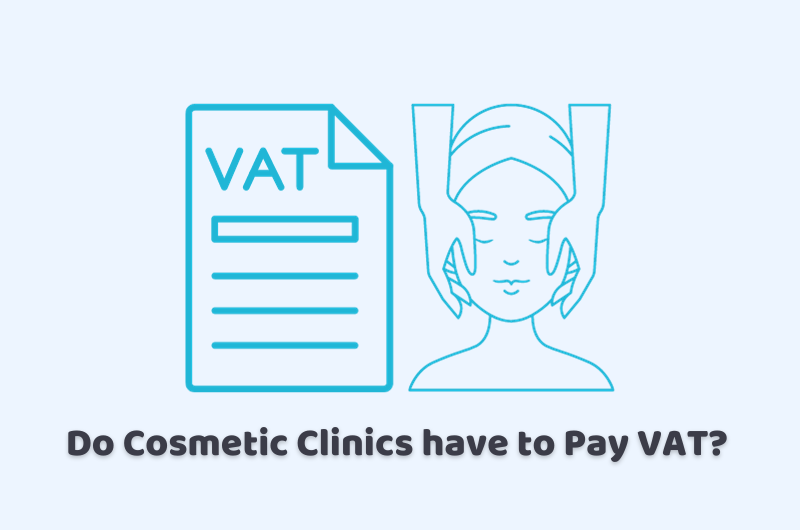
10/11/2023Tax News and Tips , VAT
Are you a cosmetic clinic owner wondering whether you have to pay VAT on your services? Then this blog is for you.
When you’re employed in a cosmetic clinic in the UK, staying informed about industry-specific regulations is essential. HMRC enforces distinct sets of rules tailored to each sector, and non-compliance can result in fines imposed by regulatory authorities. In the realm of VAT, unique regulations and guidelines are applicable to various industries, and cosmetic clinics are no exception to this rule.
In this blog post, we aim to demystify VAT taxation’s intricacies within the clinic setting. To kick off, we’ll delve into a real-world scenario featuring Illuminate Skin Clinics, Ltd. This cosmetic clinic found itself in a legal dispute with HMRC due to VAT non-compliance, and the ramifications of their case bear notable significance for the industry at large. Subsequently, we’ll elaborate on the applicable VAT rate for those operating cosmetic clinics. Stay with us until the conclusion for comprehensive insights!
If you need a consultation on VAT, contact us!
FTT’s Recent Ruling for Cosmetic Clinics
FTT has given a recent ruling in 2023 that has significant implications for the industry. The ruling was given in an appeal made by Illuminate Skin Clinics Ltd. Illuminate, a UK-based company specialising in cosmetic treatments encompassing aesthetics, skincare, and wellness, encountered a VAT-related predicament. The company initially registered for VAT in 2014 but later deregistered in 2017. However, their VAT troubles commenced in 2019 when HMRC declared that the company no longer qualified for VAT exemption.
This determination arose following an inspection of the clinic by HMRC in 2019, leading to the conclusion that the VAT tax repayment claimed by the company for the tax years 2012–2016 was not applicable. HMRC’s stance was rooted in the belief that the services and products offered by Illuminate were not eligible for VAT exemption. In response, Illuminate opted to contest this decision, taking the matter to the First Tier Tribunal (FTT).
Following a protracted four-year legal battle, the FTT delivered its verdict in 2023. The tribunal ruled that, as the services and products provided by Illuminate did not fall under the category of medical care, VAT would indeed be applicable. Let’s delve further into the implications of this decision.
What Exactly is Medical Care?
The ruling hinged on the assessment that the company’s services did not align with the definition of medical care. In accordance with both the First Tier Tribunal (FTT) and UK legal criteria, medical care entails the diagnosis, treatment, or remedy of diseases or health disorders. Crucially, these services should be geared towards therapeutic objectives.
Regrettably, the evidence presented by Illuminate to the FTT failed to substantiate this crucial criterion. According to the tribunal, the company could not establish that its services were inherently therapeutic in nature. As a result, the verdict went against Illuminate Skin Clinics Ltd.
How Does This Affect Your Business?
The outcome of this case carries noteworthy consequences for the cosmetic sector, particularly cosmetic clinics. For those offering services like fat freezing, thread lifts, or chemical peels, VAT exemption is no longer applicable. Likewise, clinics providing services such as fillers, facials, and intravenous drips are not considered within the realm of medical care. Consequently, there is a need to reevaluate and readjust tax calculations. The question remains: how much VAT will now be owed?
How Much VAT Do You Have to Pay?
Per the verdict issued by the First Tier Tribunal (FTT), cosmetic treatments are now subject to the standard VAT rate. Presently, in the ongoing fiscal year, HMRC has established the standard VAT rate at 20 percent. Consequently, if the nature of your services cannot be substantiated as falling under medical care, you will be obligated to remit the tax without any possibility of repayment. In order to remain proactive and align with evolving trends, it becomes imperative to reevaluate your tax calculations to ensure your clinic is in compliance with the VAT requirements.
Can We Help?
At CruseBurke, we recognise the evolving landscape following the FTT’s recent decision. Consequently, we offer access to top-tier tax advisors and accountants in London. Our experienced cadre of accountants possesses an in-depth comprehension of the intricate UK tax framework, enabling you to steer clear of penalties. When you choose to collaborate with CruseBurke, you ensure that you remain consistently informed about the most current industry developments.
If you need help recalculating your taxes, visit CruseBurke!
A Brief Summary!
Indeed, VAT is applicable to cosmetic treatments in the UK, given that these services do not meet the criteria for medical care. Illuminate’s case study serves as a testament to the requirement of VAT remittance in the absence of proof that your services possess therapeutic intent. If your offerings encompass treatments like fillers, thread lifting, or fat freezing, ensuring VAT compliance is imperative.
For assistance with tax calculations, enlisting the support of a trustworthy accounting partner well-versed in UK regulations is a prudent course of action. They can navigate the complexities of UK law and assist you in meeting your tax obligations.
We at CruseBurke provide you with the best tax advisory and accounting services in London. Click here to get an instant quote!

